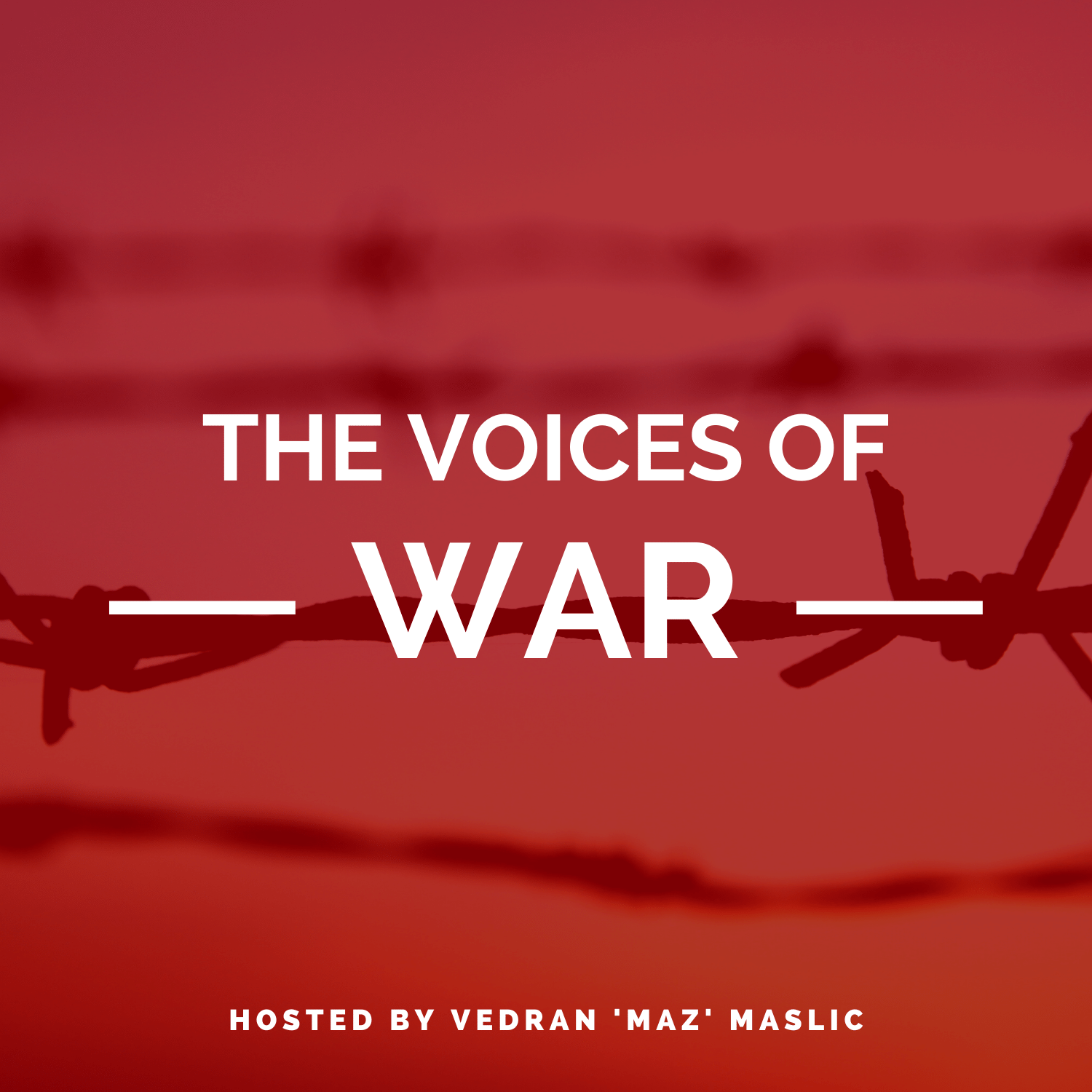
‘The Voices Of War’ is guided by a simple vision—to scratch below the simple narratives of war through the voices of those who understand its complexities.
To do this, I speak with refugees, soldiers, negotiators, academics, development workers, and anyone else whose life has been shaped by war, be they a survivor, a perpetrator, a mediator, a student, or a healer of it.
Ultimately, I want to make it lucid that neither war nor peace is a forgone conclusion. Both are a product of upstream causes that make one or the other more likely. Understanding and embracing this fact is critical when trying to find moral and ethical solutions to our many local, regional, and global challenges.
Episodes
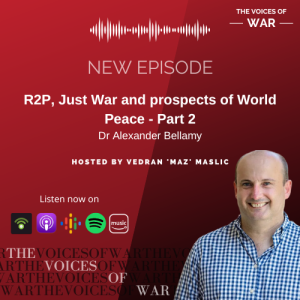
Thursday Oct 20, 2022
71. Dr Alexander Bellamy - R2P, Just War and prospects of World Peace - Part 2
Thursday Oct 20, 2022
Thursday Oct 20, 2022
This is Part 2 of my discussion with Dr Alex Bellamy, author of ‘World Peace And How We Can Achieve It’, which was the basis for our discussion. If you haven’t listened to Part 1 yet, I suggest you do that first as some discussions in part 2 might otherwise seem out of context. You can listen to part 1 here.
Like in part 1, we covered many topics, including:
Are humans wired for violence?
How states can actively reduce the likelihood of war
Clash of ‘Helsinki’ vs ‘Yalta’ visions
The paradox of US hegemony
The UN as a global project
Discussion on Interests vs Values
Military Industrial Complex and acquisition of arms
The role of International Humanitarian Law
Implementing the laws we already have to achieve Peace
Rivalry between competing visions on how the world should be organised
During this chat, Alex and I discussed Samuel Moyn's book, 'Humane: How the United States Abandoned Peace and Reinvented War'. I previously spoke with Samuel about this book and its thesis. You can find that interview here.
If you like what you’ve heard, please consider liking and reviewing the show wherever you get your pods. You can also support the show on our Patreon page here.
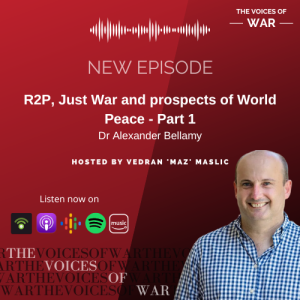
Monday Oct 17, 2022
Monday Oct 17, 2022
Today, I spoke with Dr Alex Bellamy, who is a professor of peace and conflict studies and director of the Asia Pacific Centre for the responsibility to protect at the University of Queensland.
He is the author of numerous books, including ‘World Peace And How We Can Achieve It’, which was the basis for our discussion today. However, as you’ll hear, we covered many topics, including:
Outline of Responsibility To Protect (R2P)
Origins of the World Peace movements
Similarities of the extreme left and extreme right
Individual rights as a bulwark to collective violence
Importance of ideology and narrative in motivating wars
The paradox of nationhood – internal coherence at the cost of external differentiation
Galvanising of identity when under threat
Internal contest for the American identity
Some of the topics we cover in Part 2, coming out on the 20th of October, are as follows:
Are humans wired for violence?
How states can actively reduce the likelihood of war
Clash of ‘Helsinki’ vs ‘Yalta’ visions
The paradox of US hegemony
The UN as a global project
Discussion on Interests vs Values
Military Industrial Complex and acquisition of arms
The role of International Humanitarian Law
Implementing laws we already have to achieve Peace
Rivalry between competing visions on how the world should be organised
If you like what you’ve heard, please consider liking and reviewing the show wherever you get your pods. You can also support the show on our Patreon page here.
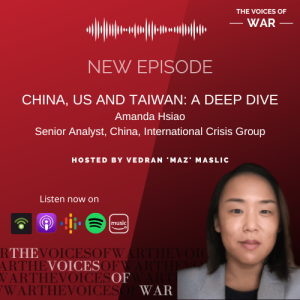
Monday Oct 03, 2022
69. Amanda Hsiao - China, US and Taiwan: A deep dive
Monday Oct 03, 2022
Monday Oct 03, 2022
Today, I spoke with Amanda Hsiao who is the Senior Analyst for China at the International Crisis Group. She joined me to shed some light on the increasing tensions between Washington and Beijing.
Amanda did this by tackling questions such as:
What are key points of difference in the US and Chinese worldviews?
Why are both sides intentionally elevating tensions?
What has led to the current change in decades-long status quo?
What is the importance of President Xi’s declaration of ‘reunification’ by 2049?
Why is Taiwan so important to both China and the US?
What do people in Taiwan want?
What lessons is China drawing from the Russian invasion of Ukraine?
Amanda’s work at Crisis Group focuses on conflicts in which China plays an important role, and developments in China’s foreign policy that relate to conflict prevention and resolution. As you will hear, it is understandable why she is a respected go-to voice on matters affecting China and the region. Some of the topics we covered are:
Amanda’s journey into researching China
Current state of affairs between China and the US
Increased tension = better preparedness
Narratives for domestic vs international audiences
The role of history in China’s quest for ‘national rejuvenation’
International laws, hypocrisy, and moral high ground
The risk of a ‘hot’ war
Language of ‘Reunification’ vs ‘unification’ with Taiwan
Complexity surrounding Taiwan’s status
Shifts in perceptions, especially the youth, in Taiwan
The historical, cultural and strategic importance of Taiwan to China
Lessons China is learning from Russian invasion of Ukraine
Regional impact of growing tensions
Current crisis management mechanisms and what else is needed
Likelihood of Taiwan pursuing independence
Relevance of Chinese demographics
Assessment of risk of Chinese invasion of Taiwan
If you like what you’ve heard, please take a moment to like and review the show wherever you get your pods. You can also support the show on our Patreon page here.

Friday Sep 23, 2022
68. Special Release: Dr Mike Martin and John Spencer - An update on Ukraine
Friday Sep 23, 2022
Friday Sep 23, 2022
Today, I spoke with Dr Mike Martin and John Spencer who joined me for an update on the situation in Ukraine.
This conversation was recorded just after 9pm on the evening of 22nd of September, Ukraine time.
Some of the topics we covered are:
Impact of recent Russian battlefield losses
Significance of Putin’s ‘partial mobilisation’ and what it might mean
Attrition vs. Manoeuvre warfare
Possible next moves by Ukraine
The narrative surrounding the ‘referendums’ and their possible purpose
Thoughts on the ongoing weapons debate, such as about ATACMS
The risk of a collapsed Russia
Predictions for upcoming weeks and months
My previous conversations with Mike and John about Ukraine can be found below:
64. John Spencer - On Ukraine, Urban Warfare and lessons learnt
58. Dr Mike Martin and LTGEN (Ret.) Arne Dalhaug - Update on the Russian invasion of Ukraine
If you like what you’ve heard, please consider liking and reviewing the show wherever you get your pods. You can also support the show on our Patreon page here.
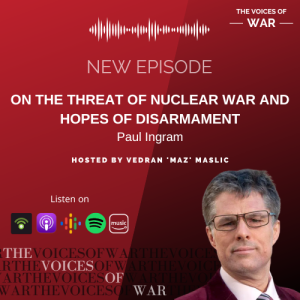
Monday Sep 19, 2022
67. Paul Ingram - On the threat of nuclear war and hopes of disarmament
Monday Sep 19, 2022
Monday Sep 19, 2022
My guest today is Paul Ingram, who is the Academic Programme Manager at the Centre for the Study of Existential Risk (CSER) at the University of Cambridge.
Up to a few months ago, he was also the Director of Emergent Change, which he established to further the understanding and practice of the Stepping Stones Approach (SSA) to nuclear disarmament. Prior to that, he was the Executive Director at British American Security Information Council (BASIC) where he developed the Stepping Stones Approach along with his colleagues from the Swedish Foreign Ministry. Throughout his extensive career, Paul has worked across the world on many projects related to nuclear disarmament.
Some of the topics we covered are:
Paul’s journey into research of existential risk
Likelihood of getting rid of atomic weapons
Whether existing global structures can help mitigate catastrophic risks
The importance of context and history when dealing with rogue actors
Importance of inclusion and diversity
Challenges of quantifying risk of nuclear war
Explanation of how nuclear deterrence works
What happens if Russia, as we know it, collapses?
NATO , US, and B61-12 nuclear bombs
Nuclear weapon command systems and current safeguards
Nuclear disarmament and the ‘Stepping Stones Approach’
I made mention in the preamble about a report on the Non-Proliferation Treaty Review Conference. You can find that report here.
You can also find out more information about Russian nuclear weapons in this article by Hans M. Kristensen from 25th February 2022.
If you like what you’ve heard, please consider liking and reviewing the show wherever you get your pods. You can also support the show on our Patreon page here.
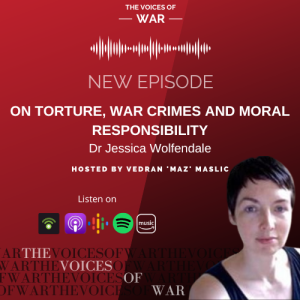
Thursday Sep 08, 2022
66. Dr Jessica Wolfendale - On torture, war crimes and moral responsibility - Part 2
Thursday Sep 08, 2022
Thursday Sep 08, 2022
This is Part 2 of my conversation with Dr Jessica Wolfendale, who is an author, ethics professor and expert on torture and war crimes. If you've missed Part 1 of this discussion, I suggest you listen to that first here.
Some of the topics we covered in Part 2 are:
The dispositional account and cognitive-affective personality system
Military culture and socialisation
Freedom and resentment
Moral ignorance is by no means an excuse
Integrating the victim’s perspective into military training
The power of reconciliation
Jessica’s future work on depictions of war crimes
During the chat, I made reference to my conversation with Deane-Peter Baker about moral drift in the context of military ethics. You can find that interview here.
Additionally, if you'd like to hear more about the position I take on the idea of 'free will', I recommend listening to episode 33 with the renowned 'free will sceptic', Gregg Caruso. You can find it here.
If you like what you’ve heard, please consider liking and reviewing the show wherever you get your pods. You can also support the show on our Patreon and Buy Me A Coffee page on the links below:
Patreon: https://www.patreon.com/thevoicesofwar
Buy Me A Coffee: https://www.buymeacoffee.com/thevoicesofwar

Monday Sep 05, 2022
Monday Sep 05, 2022
This is Part 1 of my conversation with Dr Jessica Wolfendale, who is an author, ethics professor and expert on torture and war crimes. She joined me to try and tackle the dichotomy of how to reconcile one’s perception of oneself with one’s actions, within the context of atrocities carried out in war.
She does this by asking questions such as, ‘How do good people commit atrocities, like torture, and how are their views on killing impacted?’ and ‘Does the military training process make excessive violence acceptable and permissible in certain contexts, such as war?’.
Jessica is the author of ‘Torture and the Military Profession’, arguing that the prevalence of military torture is linked to military training methods that cultivate beliefs connected to crimes of obedience. She also co-authored ‘War Crimes: Causes, Excuses, and Blame’, with Matthew Talbert, where they unpack factors that can lead to war crimes as well as wrestle with the justness of responsibility and blame attributed to perpetrators.
Some of the topics we covered in Part 1 are:
Capital punishment as detached, humane killing
The normalisation of violence
How do we live with what we’ve done?
Forgiveness, self-forgiveness and atonement
Obedience to authority
The Milgram Experiments and the Good Samaritan Study
Circumstances and the situational account
The justification of torture in war
Part 2 will be released on 8th of September where we discuss topics such as:
The dispositional account and cognitive-affective personality system
Military culture and socialisation
Freedom and resentment
Moral ignorance is by no means an excuse
Integrating the victim’s perspective into military training
The power of reconciliation
Jessica’s future work on depictions of war crimes
If you like what you’ve heard, please consider liking and reviewing the show wherever you get your pods. You can also support the show on our Patreon and Buy Me A Coffee page on the links below:
Patreon: https://www.patreon.com/thevoicesofwar
Buy Me A Coffee: https://www.buymeacoffee.com/thevoicesofwar
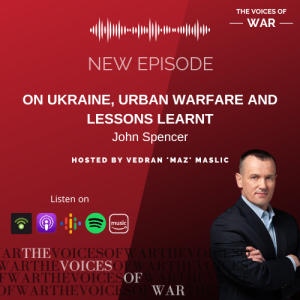
Monday Aug 22, 2022
64. John Spencer - On Ukraine, Urban Warfare and lessons learnt
Monday Aug 22, 2022
Monday Aug 22, 2022
Today, I spoke with John Spencer who is an award-winning scholar, professor, author, combat veteran, and internationally recognised expert and advisor on Urban Warfare and other military related topics. John currently serves as the Chair of Urban Warfare Studies with the Madison Policy Forum and was until recently the Chair of Urban Warfare Studies at the Modern War Institute at West Point. He is also the Co-Director of the Urban Warfare Project, and host of the Urban Warfare Project podcast.
John is also the author of the ‘Mini-Manual for the Urban Defender’, which is a short compilation of John’s vast experience and there are currently over 100,000 copies of the manual in Ukraine, where it’s being used daily by the defenders.
Some of the topics we discussed are:
John’s background in Urban Warfare
Why Urban Warfare is the hardest
Explanation of a possible shift in initiative
The strategic importance of Kherson
Likelihood of Putin seeking a ‘frozen’ conflict
The ‘Battle of Kyiv’ and why Ukraine succeeded
Why understanding the ‘human domain’ is critical
Information and connectivity as weapons of war
Birth of ‘The Mini-Manual for the Urban Defender’ and its ongoing usage in Ukraine
Conditions necessary for success of ‘Total Defence’
Reminder why Urban Warfare is critical and here to stay
Why training for the conduct of area defence is essential
Reminder of why terrain is important
The ‘rule book’ of a nuclear-armed state
Importance of a Ukrainian victor to broader geopolitical tensions
During the chat, I made reference to my conversation with Carl Miller about Russian influence operations in the BRICS (Brazil, Russia, India, China and South Africa) countries. You can find that interview here.
If you like what you’ve heard, please consider liking and reviewing the show wherever you get your pods. You can also support the show on our Patreon and Buy Me A Coffee page on the links below:
Patreon: https://www.patreon.com/thevoicesofwar
Buy Me A Coffee: https://www.buymeacoffee.com/thevoicesofwar
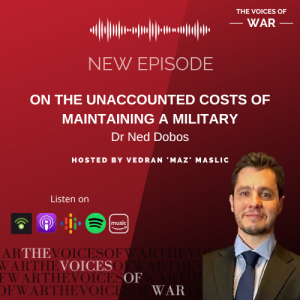
Monday Aug 08, 2022
63. Dr Ned Dobos - On the unaccounted costs of maintaining a military
Monday Aug 08, 2022
Monday Aug 08, 2022
If you'd like to help improve the show, please visit our Patreon page at https://www.patreon.com/thevoicesofwar
---
My guest today is Dr Ned Dobos, who is a Senior Lecturer in International and Political Studies at the University of New South Wales in Canberra. He joined me to discuss his more-recent book, ‘Ethics, Security, and the War Machine: the True Cost of the Military’. Some of the topics we covered are:
Ned’s background and entry into military ethics
Explanation of Ned’s thesis, which asks whether justification of war necessarily justifies maintaining a military
Discussion on military as an ‘insurance policy’
The challenge of the classic security dilemma
Fear induced aggression and the Pre-emptive Strike Experiment
Discussion on Russian invasion of Ukraine
Military conditioning as potentially morally injurious
How we ensure accountability for possible moral injury
The Civil-Military gap and the ‘Veteran Superiority Complex’, and why they matter
The risk of military coups and what makes one more likely
Accounting for overconfidence, Einstellung Effect and other cognitive biases when considering war
Gene Sharp and the post-military defence system
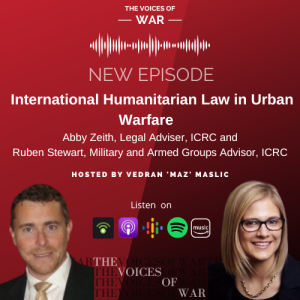
Monday Jul 25, 2022
Monday Jul 25, 2022
Link to rate or review the podcast: RateThisPodcast.com/thevoicesofwar
Our Patreon page: https://www.patreon.com/thevoicesofwar
---
My guests today are Abby Zeith and Ruben Stewart from the International Committee of the Red Cross. Abby is a Legal Adviser in ICRC’s Arms and Conduct of Hostilities Unit where her work focuses on urban warfare and the conduct of hostilities more generally.
Ruben is a Military and Armed Groups Advisor in the ICRC unit that manages relations and dialogue with arms carriers. He focuses on Non-State Armed Groups, battlefield behaviour and new technologies.
Abby and Ruben join me today to discuss Urban Warfare, including aspects of International Humanitarian Law that seek to govern it, as well as issues related to the conduct of combatants and impact of Urban Warfare on civilians affected by it. Some of the topics we covered are:
Abby and Ruben’s backgrounds and entry into the ICRC
Understanding ‘good faith interpretation’ in International Humanitarian Law (IHL)
Defining ‘urban warfare’
Three reason why urban areas are frequently targeted by belligerents
Challenges for IHL in urban warfare
Impact of war on moral frameworks
Lessons captured in ‘Commander’s Handbook on reducing civilian harm in Urban Warfare’
Importance of appropriate doctrine and training for urban warfare
Impact of culture on understanding and application of IHL
Convincing belligerents of the value of IHL
The costs of non-compliance
The role of technology in urban warfare
Passionate discussion about Samuel Moyn’s thesis that humane war is more palatable to domestic audiences and therefore makes war a more appealing political option
Second and third order effects of urban warfare on civilians
Key lessons for those fighting urban wars to keep in mind
We referred to a couple of important documents during our chat. You can find the links to those below:
Reducing Civilian Harm in Urban Warfare: A Commander’s Handbook
The Roots of Restraint in War
Some additional resources you might find of interest are:
Urban warfare: an age-old problem in need of new solutions - Humanitarian Law & Policy Blog
Explosive Weapons with Wide Area Effects: A deadly choice in populated areas
Understanding Civilian Harm in Raqqa and Its Implications for Future Conflicts
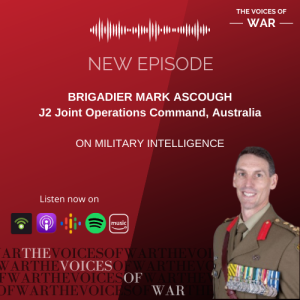
Monday Jul 11, 2022
61. Brigadier Mark Ascough - On Military Intelligence
Monday Jul 11, 2022
Monday Jul 11, 2022
Today, I’m speaking with Brigadier Mark Ascough, who is the current Director General of Intelligence at the Headquarters Joint Operations Command of the Australian Defence Force.
Brigadier Ascough joined me to talk about all things intelligence and how he sees the field evolve into the future. Some of the things we covered are:
Mark’s background and entry into the Army
Life as the J2, HQJOC
The role of ‘Intelligence’
Impact of the ‘Five Mores’
Challenges for future intelligence professionals
Dangers of bias in intelligence analysis
Moral courage in intelligence
Training for ethical challenges
Importance of understanding culture
Intelligence – too much or not enough power?
Leadership in intelligence
-----
If you like what you hear, please consider liking and reviewing the show wherever you get your pods. You can also support the show on our Patreon and Buy Me A Coffee page on the links below:
Patreon: https://www.patreon.com/thevoicesofwar
Buy Me A Coffee: https://www.buymeacoffee.com/thevoicesofwar

Monday Jun 27, 2022
Monday Jun 27, 2022
My guest today in Dr Tony Ingesson, who is an Assistant Professor of Intelligence Analysis at the Department of Political Science at Lund University in Sweden. His current research interests are decision-making, organisational cultures and technological aspects related to intelligence and counterintelligence. For his PhD dissertation, Tony studied tactical decision-making in high-stress situations in several different military units conducting operations in wars ranging from WWII to the UN mission in Bosnia and Herzegovina in the early 90s.
He joins me today to discuss organisational culture, sub-cultures and their impact on group behaviour. Some of the topics we discussed are:
Tony’s background and service in all three arms of the Swedish Armed Forces
Conscription in Sweden
Cultures within Armed Forces
Defining ‘culture’ and its influence on behaviour
Culture as a tool for management of ‘Stress’ and ‘Uncertainty’
The role of symbols and tradition
Nordbat 2 in Bosnia and Herzegovina
Swedish ‘Mission Command’ and its origin
Reality of war in Bosnia and Herzegovina
Nordbat 2 in combat despite restrictive UN Rules Of Engagement
Swedish high-trust culture and its impact on the Swedish Armed Forces
Training against bias in intelligence analysis
Why members of a military are not ‘professionals’
Exploring whether we are asking too much from our soldiers
-----
If you like what you hear, please consider liking and reviewing the show wherever you get your pods. You can also support the show on our Patreon and Buy Me A Coffee page on the links below:
Patreon: https://www.patreon.com/thevoicesofwar
Buy Me A Coffee: https://www.buymeacoffee.com/thevoicesofwar
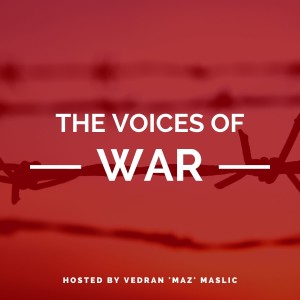
Monday Jun 20, 2022
59. My personal reflections on war
Monday Jun 20, 2022
Monday Jun 20, 2022
Today is June 20th, and it is World Refugee Day. It has prompted me to reflect on my most recent episode, where I recorded an update on the situation in Ukraine with guests Arne and Mike. I’m heartened to see the interest the conversation has received—not for bragging rights, but because it helps, ever so slightly, to keep the attention on those who must live with the consequences of this invasion, including the more than 7 million individuals who have already been forced to flee, and whose real battle has only just begun.
An unfortunate reality of our current times is that conflicts around the world are forgotten almost as quickly as they begin. Since the world took notice of the Russian invasion of Ukraine almost four months ago, outrage and interest has subsided such that any updates on the war feature less and less frequently on most major news sites. But we shouldn’t be surprised. We only need to look at other ongoing conflicts—take Yemen, Afghanistan, Syria, Ethiopia, or Sudan, for example, where hundreds if not thousands of lives have been lost just this year alone—to see how quickly conflicts disappear from our collective consciousness.
Aside from the difficulties faced by the estimated one hundred million refugees fleeing various conflict zones across the globe, one of the aspects that affects and saddens me the most is the recognition that for these people, it is only after they are long forgotten by the rest of us that their true battle begins.
These conflicts are so deeply personal to me because, as most of you by now know, I am a product of the Bosnian war from the early 90’s. When the war broke out in my home city of Sarajevo, I was 10 years old. Before the war, we lived a completely regular, or even a privileged life. My mum worked as a physics professor at one of the country’s best high schools and my dad was an engineer working at one of the biggest and most-prominent engineering companies in former Yugoslavia. This was the same company that brought Russian gas into the Balkans, as well as the company that engineered Saddam Hussein’s personal bunker in Baghdad. In short, my brother, who is three years older than me, and I, weren’t left wanting for much. Apart from school, our weekdays included lots of playing and running around the neighbourhood with the dozens of other children living on our street. Weekends always included visits to my paternal grandmother, who lived in the centre of Sarajevo, as well as my cousins, both from mum’s and dad’s side. We’d escape Sarajevo to our weekend home my parents were building not far outside of the city, or to the one that my maternal grandfather built all by himself a few hours’ drive out of the city. Winter holidays were spent skiing on one of the nearby Olympic mountains dominating the Sarajevan horizon. In summer, we travelled to a beautiful coastal town in Croatia, where we kept a fully equipped trailer a stone’s throw from a secluded pebbled beach. Life was good.
As I now watch events unfold in Ukraine, I am reminded of the naivety and innocence of not only my parents, but also the rest of the country, that war could simply not occur. I mean, Bosnia is in the heart of Europe. Four hours drive and you’re in Austria, seven and you’re in Germany. No way would the rest of the world let the Bosnian Serbs, supported intimately by Serbia, start a war. The world had moved on, Europe had moved on, from large scale military confrontations. I remember in those final days before all hell broke loose, ordinary citizens, including my parents, neighbours, teachers and just about everyone else, going to huge anti-war protests. I was glued to the TV watching as they sang ‘Give Peace A Chance’, with every Sarajevan who had a lighter, which was just about every one of them, holding it lit above their head and swaying their arms in synch with the song. Although a powerful sight, and one that I get emotional over, even today, I now realise how foolish and naïve it was to hope that Bosnians could stop the inevitable march to war. Those in power had already decided, plans had been drawn up, troops gathered, weapons and supply lines prepared. All that was necessary was a spark to kick it all off.
As I sit here and watch the millions of refugees pouring out of Ukraine, I remember the sense of helplessness of not being able to change your destiny. The night before our suburb was occupied by Serb forces, my mum had a terrible feeling that something was about to happen. It was the first night in 20 years of living in the same house that she could hear the flow of a river, a kilometre away. It was an eerily quiet night. So, the next morning, the four of us, my dad, mum, brother and I, packed a backpack each and left our house to go and stay with my aunt, uncle and two cousins a little further into town. That day, the barricades around Sarajevo went up, and my suburb fell into Serb hands, with many of our neighbours who were left behind experiencing grave abuse by the invading forces. Fighting-age men were detained and taken away as prisoners. Some were never heard of again. Our house, the home I grew up in, was taken over by a police commander who threw my brother’s and my toys out into the backyard to rot. Our neighbour, the angel of a lady who also spent hours teaching me how to read and write, managed to wrestle some of our most-treasured possessions from the intruder, including some our family photo albums. Years later, during her first visit since the war, my mum was able to recover those cherished mementos of a life long gone.
We stayed with my aunt and uncle for those first few days of hell breaking loose. I remember watching tanks occupy positions on top of a small hill about 500m opposite of my aunt and uncle’s house. They weren’t shooting yet, but their command of the entire suburb from an elevated position was daunting as it was perplexing. How is this possible? These were our people? Not even two years ago we all sang the same anthem as Yugoslavia qualified for the semi-final in the FIFA World Cup in Italy. We all speak the same language. Hell, most of us didn’t even know that there was such a thing as different ethnicities. And yet here we were, cowering in the shadow of their barrels awaiting the inevitable. And it didn’t take long. Several times in those first days, air raid sirens echoed around the city, forcing us into bomb shelters scattered around the suburb. We were lucky that my aunt and uncle’s house was literally meters away from one of these, where we spent a number of anxious hours waiting for the threat to lift. A few days later, as the bombing really started, my parents decided that we’d be safer at my grandma’s house, whose apartment was in the heart of the city. We would spend the following few months there, until our escape from Sarajevo.
I remember sitting in the cellar for hours on end, waiting for the shelling to stop. My grandma’s building had about 10 apartments, and just about all of the occupants would hide below ground when the shelling would start. By now, it was occurring frequently enough that the cellars had to be cleaned up, chairs and tables were brought in, as well as candles, food and water. Power would frequently go out, as would water and getting basic supplies was becoming a serious challenge. To pass the time, I remember how my brother and I used a picture of Slobodan Milosevic, the President of Serbia at the time, that had a bull’s eye superimposed on it, for target practice. We had a couple of straws and bits of rolled up paper that we would dip in some water, pretending it was poison. We’d then shoot our weapons at Milosevic’s face, who was smugly smirking at our abysmal efforts from his place of prominence on one of the cellar walls.
Ultimately, I was lucky to have had to live in a besieged Sarajevo for only a few short months. I had recently had a serious ear surgery due to a tumour behind the eardrum of my right ear. My parents knew that I would imminently need another surgery to replace my eardrum which had 13 raptures in it, but they kept this from me at the time as they wanted me to focus on my recovery before worrying about the next time I’d be going into hospital. However, the fragile state of my eardrum, and the now near-constant shelling of the city were a bad combination. At one point, my mum told me to keep my mouth open while the bombs are falling as this would allow me to easier equalise the pressure on my eardrum from any artillery and mortar blasts. I can still hear my brother making fun of me for sitting in the cellar with my mouth permanently open out of fear of my eardrum bursting.
The moment mum and dad broke the news to my brother and I that the three of us would be leaving Sarajevo the next day on a UN convoy, I remember an insatiable rage coming over me. I did not want to leave. I did not want to leave my dad behind; I did not want to leave the rest of our family behind, all my friends. I did not want to leave my city, especially not now when its mere survival was in question. My ten-year old brain could not comprehend what was happening. Only weeks ago, we lived a normal life. I was going to school. We had picnics on the weekend. We were talking about our next holiday on the Croatian coast. It all vanished overnight.
As the next day dawned, one of our neighbours, Raza, sister of one of the nation’s most prominent poets Kiko Sarajlic, gave me a hand-made Pinocchio figurine she once picked up in Italy. It was aimed to give me something to play with, she said, and that we’ll play together upon our inevitable, and surely imminent, return to Sarajevo. The irony of her words, while handing me a Pinocchio figurine, was lost on me until much later.
Looking back, my reflection upon these memories has always had a certain nonchalance; a certain detachment from the reality of what they truly represented of my childhood. Now, as a father, the thought of any child, or in fact any person, having to flee their home after being innocently caught in conflict, much less conflict at the hands of an egomaniacal dictator attempting to assert regional, if not global, dominance, brings tears to my eyes.
Years later, my heart hurts for the fear my parents must have felt. The fear of not knowing what the next day would bring. The fear of not knowing how or if they could keep their young children alive and safe. The fear of the future that would befall their children should they be left without a parent or guardian to look out for them. The fear of the trauma and scars that may imprint on them in the days, weeks, months, and years of hardship to come.
As a father, the thought of my children having to live through such events sends a heaviness through me. But that heaviness is quickly replaced by anger. Because so many of these conflicts are unnecessary. Avoidable, even. And yet we enter into them so lightly. Far too lightly.
Thinking back to my own experiences, I know that what I lived through was easier than what my parents lived through. Childhood resilience is a wonderful thing. But, having to help your wife and children flee while you stay back to defend your homeland, as was the case for my father, or having to seek refuge in a foreign country where you don’t speak the language or have any of your qualifications recognised, as was the case for my mother, seem like far more challenging experiences. Watching your children become marginalised as they’re branded the poor foreigners in a new school. Having to rely on government handouts for the food, clothing and shelter you once provided in abundance for your family. Lining up for hours on end at an Immigration Office to apply for the less-than-welcoming residence status known as ‘Duldung’, which roughly translates to ‘tolerating or bearing you’. Many mistook this for a residence permit. It wasn’t! It was merely the suspension of the state’s obligation to deport you. It was a tactical pause, in your otherwise precarious existence and statelessness. After all that, there are the next 30 years coming to terms with never knowing the final resting place of friends and family, or the trauma associated with seeing your loved ones killed in front of your eyes. There is the loss of your identity, your history, your memories, yourself. These are the unspoken, unseen, unaccounted costs of war.
As the discussion around the invasion of Ukraine moves onto what a decisive victory looks like and how an end may come about, I urge those that care, those who are angered by needless acts of violence, to remember that for millions of innocent survivors, both in Ukraine and Russia and around the world, often, the immediate costs of these conflicts are the lightest and most superficial. The real costs—those which our children, families, and our communities bear, will play out in the months, years, and decades to come. I only need look to my own experience, where almost 30 years on, the balcony and building from which I watched those tanks roll in, still carry the scars from rockets and artillery of my childhood, to know that these are costs that humanity we’ll be paying for generations to come.
On this Refugee Day, take a moment to pause and look around. Take stock of what you have, and not of what you’re missing. Take comfort in the relative safety of your country, of a roof over your head, your job, or the car you might be driving right now. Think about the family dinner you get to enjoy tonight, or your child’s birthday party you get to organise. Think about the bar you’ll go to for ‘knock-off drinks’. Think about all of that, and then remember the 100 million refugees who won’t be thinking those thoughts.
And for those of you in positions of authority, or those who might command troops in war, take a moment to think about the next order you’ll give. Think about the impact that bomb, rocket, shell, or round will have. Not just on your target, but on those you might write off as collateral damage. Remember that the few minutes it took you to give, or to carry out an order, might leave physical, psychological, and spiritual scars on a child lasting a lifetime. What might be your acceptable collateral damage, might be someone’s mother, father, sister, or brother. It might be someone’s husband, wife, boyfriend, or girlfriend. It might be someone’s friend. And one of those your bombs force to flee, might be a child facing a life of uncertainty and instability. A child, just like me.
Finally, and where I hope this thought bubble to land, think about what you can do to help. Can you forgo a few coffees or drinks, and donate the money to the UNHCR, or another of the many amazing organisations helping those most in need? Can you donate your time to help in a shelter? What about old clothing? Can you donate some of it? How about attending one of the many activities marking the day? If nothing else, use your voice on social media or elsewhere to increase awareness of this growing need. But whatever you do, don’t just turn away.
Music: Adagio For Strings, by Samuel Barber
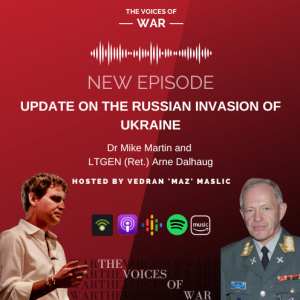
Tuesday Jun 14, 2022
Tuesday Jun 14, 2022
Today, I spoke with Dr Mike Martin and retired LTGEN Arne Dalhaug, who have both provided regular commentary on the Russian invasion of Ukraine in regular and social media.
Mike is a former British Army Officer who subsequently completed his PhD studying war and conflict. He has published a number of books, including ‘An Intimate War’, still one of the go-to books on understanding Afghanistan, as well as ‘Why We Fight’, a book that explores root causes of human conflict and war.
Arne is a retired three-star general who was previously the Deputy Chief of Norwegian Armed Forces, served as the Norwegian Military Representative to the NATO Military Committee, and was the Commandant of the NATO Defense College. After retiring from the military, Arne served in a senior position for the OSCE in the non-government-controlled area in eastern Donbas in Ukraine.
They join me today for an update on the ongoing Russian invasion of Ukraine. Some of the topics we covered are:
Current operational situation on the ground
The potential deception of Sieverodonetsk
State of the Russian Army
The likelihood and ‘dangers’ of a peace deal
The risk of nuclear war
Ukrainian requirements to sustain combat operations
The role of Turkey
Chinese view of the war
Putin’s most-likely and most-dangerous courses of action
For previous discussions with Mike and Arne, check out these episodes:
Arne:
Arne Dalhaug and Wolfgang Sporrer - On the War in Ukraine
Special Release: Lieutenant General (Ret.) Arne Bård Dalhaug: On the current Russia/Ukraine crisis
Mike:
Dr Mike Martin - Update on unfolding situation in Afghanistan
Dr Mike Martin & Dr Christopher Ankersen - Afghanistan Update and Future
Dr Mike Martin - a Soldier-Philosopher
-----
If you like what you’ve heard, please consider liking and reviewing the show wherever you get your pods. You can also support the show on our Patreon and Buy Me A Coffee page on the links below:
Patreon: https://www.patreon.com/thevoicesofwar
Buy Me A Coffee: https://www.buymeacoffee.com/thevoicesofwar

Monday May 30, 2022
Monday May 30, 2022
Today, I spoke with John Gartner, whose career as a professional soldier and security adviser spans more than five decades. During that time, he served in the Australian SAS, Rhodesian SAS, Selous Scouts, South African National Intelligence Service and as a trainer for Sri Lankan Infantry and Special Forces units. He also provided security and close protection advice to a former Saudi Arabian oil minister as well as for the Brunei Royal Family.
John joins me today to discuss lessons learnt throughout his career, which is also captured in incredible detail in his memoir titled ‘The Fading Light’. I recently finished this book, which is a combination of unbelievable operational detail as well as reflections of a man who’s seen the best and the worst side of war.
Some of the topics we covered are:
John’s entry into the Australian SAS
Reasons behind joining the Rhodesian SAS
The (changed) profile of a Special Forces soldier
Life and operations in Rhodesia
Reflections on taking a life
John’s perspective on PTSD
The importance of ‘purpose’
War, atrocities, and ‘bad apples’
Selective Western military engagements
Living and working for a Saudi sheik and Brunei Royal Family
The power of cultural and linguistic immersion
The impact of John’s career on his family
Throughout the episode, I referred to several discussions with previous guests. You can find those here:
Jason Pack - On the ’Global Enduring Disorder’
Marc Garlasco - War through the eyes of a Pentagon Chief of High Value Targeting
Harry Moffitt - A Humble Warrior
If you like what you’ve heard, please consider liking and reviewing the show wherever you get your pods. You can also support the show on our Patreon and Buy Me A Coffee page on the links below:
Patreon: https://www.patreon.com/thevoicesofwar
Buy Me A Coffee: https://www.buymeacoffee.com/thevoicesofwar
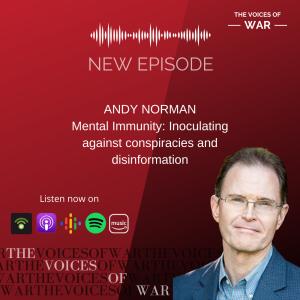
Monday May 16, 2022
Monday May 16, 2022
My guest today is Dr Andy Norman, who is the award-winning author of ‘Mental Immunity: Infectious Ideas, Mind-Parasites, and the Search for a Better Way to Think’.
His research illuminates the evolutionary origins of human reasoning, the norms that make dialogue fruitful, and the workings of the mind’s immune system. He champions the emerging science of mental immunity as the antidote to disinformation, propaganda, hate, and division.
Currently, Andy directs the Humanism Initiative at Carnegie Mellon University and is the founder of CIRCE, the Cognitive Immunology Research Collaborative.
Some of the topics we covered include:
Andy’s entry into philosophy
The mind’s ‘immune system’
Definition of ‘mind parasites’
Manipulation gone to scale
Simple conspiracy vs complex reality
The challenge of debating against conspiratorial thinking
The incentives that fuel misinformation
How to prevent mind infections
Determining whether a belief is ‘reasonable’
Evolutionary origins of our capacity to ‘reason’
Dangers of confirmation bias
Factors that make us vulnerable to ‘mind parasites’
The dangers of hitching belief to identity
Developing a ‘mind vaccine’
The ‘New Socratic Method’
During the show, Andy and I discussed a paper he wrote in response to Hugo Mercier and Dan Sperber’s book ‘The Enigma of Reason’. You can download that paper here.
-----
If you like what you hear, please consider liking and reviewing the show wherever you get your pods. You can also support the show on our Patreon and Buy Me A Coffee page on the links below:
Patreon: https://www.patreon.com/thevoicesofwar
Buy Me A Coffee: https://www.buymeacoffee.com/thevoicesofwar

Monday May 02, 2022
55. Jason Pack - On the ’Global Enduring Disorder’
Monday May 02, 2022
Monday May 02, 2022
My guest today is Jason Pack, who is the author of ‘Libya and the Global Enduring Disorder’. Jason is also a Senior Analyst for Emerging Challenges at the NATO Defense College Foundation in Rome where he leads a program titled ‘NATO and the Global Enduring Disorder’, which seeks to produce a range of content analysing our current era of geopolitics while proposing actionable solutions to our most pressing collective action challenges.
Jason is also the President of Libya-Analysis LLC, a boutique consultancy providing strategic advice to any organisations seeking to make sense of the latest political, economic, commercial and security developments in Libya. He is also the founder of the US-based non-profit ‘Eye on ISIS’, which conducts research into Islam and Islamist movements in and outside of Libya.
Some of the many topics we covered are:
Jason’s background and entry into the study of conflict
Behaviouralist, rather than realist, view of International Relations
Meaning of ‘incumbent psychology’
Decline in American exceptionalism
Defining the Global Enduring Disorder
‘Deliberative disorder’ as a political policy
Difference between the war in Iraq and conflicts like Libya, Syria, Yemen, Venezuela or Ukraine
Some of the causes behind the Global Enduring Disorder
The benefits of a global hegemon
Why market economics was not enough to unite the world
Western failures after the Cold War
The importance of social trust to domestic order
Absurdity of Libya and its representation of the Global Enduring Disorder
The complexity of the Global Enduring Disorder
The role of technology and social media in the Global Enduring Disorder
If you like what you’ve heard, please consider liking and reviewing the show wherever you get your pods. You can also support the show on our Patreon and Buy Me A Coffee page on the links below:
Patreon: https://www.patreon.com/thevoicesofwar
Buy Me A Coffee: https://www.buymeacoffee.com/thevoicesofwar

Sunday Apr 17, 2022
54. Duncan Spinner - The Fight for at-risk Ukrainians
Sunday Apr 17, 2022
Sunday Apr 17, 2022
My guest today is my good friend, Duncan Spinner. Since 2015, Duncan has been working in Ukraine and for four years was the OSCE Head of Operations for Luhansk.
Apart from sharing information on the current situation in Ukraine, this episode is also an appeal for your help in getting at-risk individuals out of harm’s way. As you’ll find out, Duncan and a small team of professionals are informally helping some of the most-vulnerable civilians whose lives are in grave danger. Please consider supporting the below GoFundMe page. Every donation helps save the lives of innocent Ukrainians.
https://www.gofundme.com/f/smm-veterans-for-smm-local-staff
Some of the other topics we covered are:
Snapshot of Duncan’s extensive experience working in conflict affected nations
Work in Ukraine as the OSCE Head of Operations for Luhansk
Questioning the Russian mindset, interpretation of victory and relationship to time
Reflecting on the ‘Russian way of war’
The power of narrative and risk of hubris
Informal rescue of at-risk and vulnerable Ukrainians from danger
The reality of those fleeing Ukraine
Getting personal protective equipment to fighters in Ukraine
The moral imperative of doing something to help
Supporting Duncan and his team
If you like what you’ve heard, please consider liking and reviewing the show wherever you get your pods. You can also support the show on our Patreon and Buy Me A Coffee page on the links below:
Patreon: https://www.patreon.com/thevoicesofwar
Buy Me A Coffee: https://www.buymeacoffee.com/thevoicesofwar

Monday Apr 11, 2022
53. Dr Deane-Peter Baker: State Ethics vs Soldier Morality
Monday Apr 11, 2022
Monday Apr 11, 2022
Today, I spoke with Dr Deane-Peter Baker, a military ethicist, who is an Associate Professor of International and Political Studies in the School of Humanities and Social Science at UNSW Canberra, where he also is co-Convenor of the UNSW Canberra Future Operations Research Group.
Deane’s work focuses mainly on the ethics of armed conflict. His current area of focus is on ethics and special operations, and he is a regular consultant to Australia’s Special Operations Command as well as the Australian Defence Force more broadly.
He joins me to today to discuss one of his recently published books, Morality and Ethics at War: Bridging the Gaps Between the Soldier and the State. Some of the topics we discussed are:
Deane’s entry into the field of military ethics
Difference between ethics and morality
Idea of individual freedom
Inculcating moral frameworks
Distinction between jus ad bellum and jus in bello
‘Disciplined disobedience’
Understanding ‘ethics inhibitors’ in a military context
Training with ethics in mind
Moral drift and moral injury
The ‘Guardian ethos’
Interests vs values argument
‘Ethical triangulation’
If you like what you’ve heard, please consider taking 30 seconds to like and review the show wherever you get your pods. You can also support the show on our Patreon and Buy Me A Coffee page on the links below:
Patreon: https://www.patreon.com/thevoicesofwar
Buy Me A Coffee: https://www.buymeacoffee.com/thevoicesofwar

Monday Apr 04, 2022
Monday Apr 04, 2022
My guest today is Dr David Whetham who is a Professor of Ethics and the Military Profession in the Defence Studies Department of King’s College London. He is the Director of the King’s Centre for Military Ethics and delivers or coordinates the military ethics component of courses for around two thousand British and international officers a year at the UK’s Joint Services Command and Staff College.
In 2020 David was appointed as an Assistant Inspector-General to the Australian Defence Force to assist in the final stages of the Afghanistan Inquiry and is the author of the report’s final Annex. He joined me to discuss issues of military ethics. Some of the topics we covered include:
David’s journey into military ethics
Defining military ethics
Jus ad bellum vs Jus in bello
Government and military tension when jus ad bellum is not met
Political leaders’ impunity when sending troops to war
Interests vs values debate
Impact of broken justifications for war
Afghanistan and impact of poor mission definition
Narrative vs reality and resulting disillusionment
Impact of the environment and whether atrocities in war are inevitable
Preparing our troops for moral dilemmas
Environmental elements that contribute to ethical demise
Special Forces, but not special
Mitigating circumstances to atrocities
Ethical drift and institutional responsibility
Realistic training for ethical dilemmas
Training to make the right decision, quicker
David mentioned the recent launch of a free app to help military service members make more informed decisions. You can find the app for both Apple and Android by searching for Military Ethics: Cards for Humanity.




